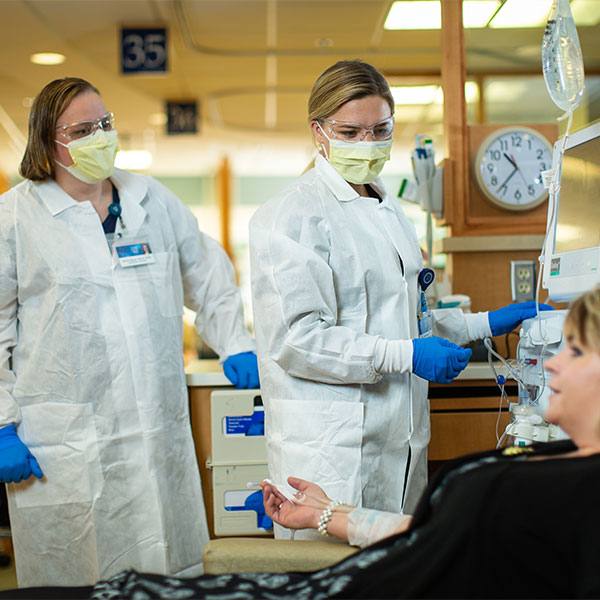-
Biotherapeutics
Driven by family, fueled by hope: Mayo Clinic researcher fights against Type 1 diabetes
Quinn Peterson, Ph.D., was a graduate student working on a team to develop new chemotherapy drugs when a life-changing phone call reset the course of his career. His daughter, Clarissa, had been diagnosed with Type 1 diabetes. Neither he nor his wife had any known family history of the disease.
"Given my background as a scientist, I felt a responsibility and an obligation to use my skills in research to address this complex disease — not only for my own children but for the many others who live with it," says Dr. Peterson.
That career pivot eventually brought him to Mayo Clinic's Center for Regenerative Biotherapeutics, where he leads a team that is developing a cell replacement therapy for diabetes. This research is supported by the center's new strategy of biomanufacturing therapies for use in early-stage clinical trials so patients can get new therapeutic options.
As Dr. Peterson's research career has grown, so has his family; He and his wife have welcomed three more children. They soon learned that two of the three younger children also have the condition. That has only strengthened his drive for a cure.
"I live diabetes 24-and-7 now. I'm excited and enthusiastic about working with my lab colleagues to find therapies that may impact the lives of millions of patients," says Dr. Peterson. "Then when I go home, I'm further motivated by the opportunity that I have to help my children manage this disease. That gives me great inspiration each day."
A chronic disease that affects millions
Type 1 diabetes affects about 1.9 million people in the U.S., including 244,000 children, according to the American Diabetes Association. It is a chronic disease in which the body's immune system attacks and destroys pancreatic beta cells that produce insulin, a hormone that controls the body's blood sugar.
Severe health complications arise when the body doesn't make its own insulin. For example, without insulin, blood sugar could spike, causing a condition known as hyperglycemia. If left untreated, hyperglycemia can cause toxic acids to build up in the blood, leading to ketoacidosis, a potentially life-threatening complication. Treating Type 1 diabetes requires lifelong insulin therapy. If too much insulin is given, hypoglycemia — low blood sugar — can occur. Extreme or prolonged hypoglycemia can lead to coma and death. The current treatment of Type 1 diabetes manages the symptoms but does not cure the disease.
For the Peterson family, it means being vigilant around the clock even as Clarissa, 17; Sarah, 12; and Seth, 8, are now able to help manage their own disease. They are constantly monitoring blood sugar levels and adjusting insulin through injections and insulin pumps. Their son, Clayton, 14, does not have this disease but is concerned for the health of his siblings.
"Every time they eat, every time they participate in a physical activity...we are monitoring blood glucose levels and adjusting insulin doses..."
-Quinn Peterson, Ph.D.

"Every time that they eat, every time they participate in a physical activity, when they wake up in the morning, before they go to bed at night, and even in the middle of the night, we are monitoring blood glucose levels and adjusting insulin doses to meet their needs," says Dr. Peterson.
Studying an alternative to insulin
Mayo Clinic researchers are studying a cell-based therapy that could eventually eliminate the need for routine blood-sugar checks, injections and pumps by restoring the body's insulin-making abilities. They are engineering cells to become pluripotent, which takes them to a state where they can be reprogrammed to become any type of cell in the body. In Dr. Peterson's research, cells are directed to become pancreatic islet cells capable of producing insulin and other hormones that are important in regulating blood sugar levels.
"We discovered in preclinical research a significant advantage to transplanting living replacement cells. The cells were able to sense the amount of glucose in their environment and secrete the appropriate amount of insulin in response to that environment," he says.
The team is seeking regulatory approval to test this discovery in humans. They are working with the Center for Regenerative Biotherapeutics on process development for on-site biomanufacturing that could accelerate this cell-based technology to early-stage clinical trials.
Hopeful for his children's future
Meanwhile, the Peterson children have become ambassadors for their disease, making the best of a difficult health condition. They've helped with diabetes fundraisers and are diabetes "buddies" who mentor and encourage other children to learn to cope with the rigors of managing Type 1 diabetes.
"My hope is that a cure for Type 1 diabetes will be realized in my children's lifetime," says Dr. Peterson.
###
Dr. Peterson's research is supported in part by the generous contributions of the Khalifa Bin Zayed Al Nahyan Foundation and the Stephen and Barbara Slaggie Family.
Research by Dr. Peterson:
A method for the generation of human stem cell-derived alpha cells








